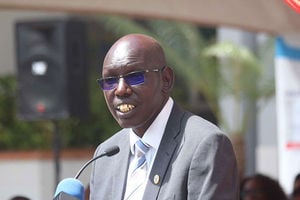Governors ignore minorities in jobs
What you need to know:
- Ms Lichuma expressed concerns that even composition of the County Public Service Board and the County Assembly Service Board was skewed to favour men compared to women and other vulnerable groups.
Governors have been accused of failing to observe the ethnic diversity rule in public employment.
The National Cohesion and Integration Commission (NCIC) has also accused the governors of focusing on dominant tribes in their counties when employing, while ignoring other tribes.
As a result of the skewed employment practices, there have been complaints that minority groups have been excluded from county-level decision-making and allocation of resources.
“The citizens have not been fairly represented in county employment positions as espoused by the various legal provisions,” according to a draft report on the County Ethnic Audits.
The report indicates that devolution has been undermined by corruption and inter-communal rivalries.
“All officers serving in the former local authorities were automatically transferred to the counties, hence, corruption and other vices were devolved, as well,” notes the report.
Governors say that the irregularities in employment will be rectified over the years in line with the spirit of the Constitution, arguing that they inherited staff from the defunct local authorities. But some of the glaring imbalances touch on recent appointments.
The report from 15 out of the 47 counties indicated that some counties have not included a single person from the minority tribes to serve in their county’s Public Service Board or as County Executive Committee (CEC) members.
Makueni and West Pokot top the list of counties that have employed only from the dominant ethnic tribes at the expense of other communities.
All nine members of CEC at Makueni are from the dominant Kamba community whereas all 10 West Pokot CEC members and another seven sitting on the county’s public service board are Pokots.
The report indicates that eight out of the 10 CEC members in Kajiado are from the Maasai community. Kambas and Kikuyus got one position each.
Its public service board has six members from the Maasai community and one from the Kikuyu community.
However, Nairobi Governor Evans Kidero stands tall as the county boss who has balanced his appointments.
He has seven members in the County Public Service Board shared out to seven different communities.
Out of the ten CEC members, the report indicates that he has four kikuyus and the rest of the slots have been shared out to six communities in the cosmopolitan city.
Women and other vulnerable groups have also been locked out of these positions despite legal provisions that compel county assemblies to reject nominations for appointment to the executive committee that do not meet the set constitutional threshold.
The NCIC Chief Executive Officer Hassan Mohamed told the Senate Committee on devolved government that some governors were reluctant to submit their reports for the exercise seemingly because they knew their records were not up-to-date.
He warned that they will have no alternative other than to sue governors who will not cooperate with the commission’s request and forward their reports for scrutiny.
The officials said that as part of their annual reporting, the county service boards will have to report on the progress of their implementation of the values and principles of the Constitution in their recruitment operations.
Trans Nzoia Senator Henry Ole Ndiema noted that governors would be enticing dominant communities in their counties with more positions to attract more votes in the next General election.
Elgeyo Marakwet Senator Kipchumba Murkomen (URP) who chairs the devolved government committee observed that some counties were grappling with none or few applications from qualified women and other vulnerable groups.
“We have cases where the suitable candidates are well remunerated elsewhere and are not willing to take a pay cut by resigning to join the county governments,” said the Senator.
National Gender and Equality Commission (NGEC) chairperson Winfred Lichuma observed that constitutional provision that not more than two thirds of public appointments shall be of the same gender, has not been met in many counties.
Skewed to favour men
“Some counties have not made deliberate efforts to ensure that this provision is adhered to, going by the number of those employed at the counties,” Ms Lichuma said.
Ms Lichuma expressed concerns that even composition of the County Public Service Board and the County Assembly Service Board was skewed to favour men compared to women and other vulnerable groups.
“In some counties, nominated representatives are referred to as bonga points and are not even allowed to speak. Other counties give favours to only to elected leaders at the expense of the nominated ones,” said Ms Lichuma.
Senator Beatrice Elachi (Nominated, APK) took issue with some governors whom she said had deliberately refused to consider women to work in their counties as stipulated in the constitution.
Utility Box:
Section 65 of the County Government Act requires the county public service board to ensure that at least 30 per cent of vacant posts at entry level are filled by candidates who are not from the dominant ethnic community.
Section 7 of the National Cohesion and Integration Act, 2008 states in part that; “All public establishments shall seek to represent the diversity of the people of Kenya in the employment of staff.”
Article 179 of the constitution provides that Members of the County Executive Committee be appointed by the County Governor with the approval of the county assembly.
County Government Act 2012, in section 35 demands that in appointing the executive committee, the governor shall 1: (a) ensure that to the fullest extent possible, the composition of the executive committee reflects the community and cultural diversity of the county; and (b) take into account the principles of affirmative action as provided for in the Constitution.
The County Government Act under section 35 (2) provides that the County Assembly shall not approve nominations for appointment to the executive committee that do not take in to account (b) Representation of the minorities, marginalized groups and communities; and (c) Community and cultural diversity within the county.




